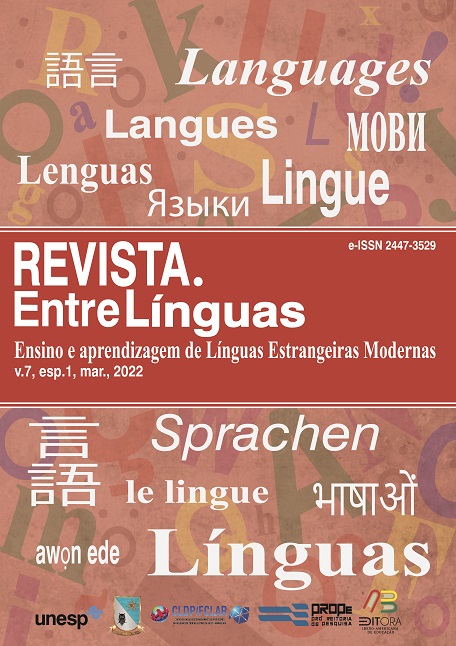Modern linguistics
A cognitive script of the situation with transmitted reliable information on the basis of german modal words
DOI:
https://doi.org/10.29051/el.v8iesp.1.16920Keywords:
Cognitive linguistics, Cognitive Script, Reliability, Modal word, The German languageAbstract
The article examines a cognitive script of the transmission of reliable information on the example of German modal words (MW). To achieve the goal of the study, a cognitive method was used, the main postulate of which is considered to be the active interaction of the structure of consciousness (mental representations) and the structure of the language. It is primarily about the representation of mental processes and their results in the language. The emergence of the cognitive method is associated with the attention of linguists, first of all, to the person himself or herself and his or her consciousness. With regard to the concept of reliability, we should note our understanding of reliability as an indication of the qualification of information as corresponding to reality, which does not cause doubts among members of a certain community.
Downloads
References
ALEFIRENKO, N. F. Cognitive linguistics: prerequisites, subject, categories. Vyatka State University Bulletin, p. 75-78, 2008. Available in: https://cyberleninka.ru/article/n/kognitivnaya-lingvistika-predposylki-predmet-kategorii. Access in: 10 May 2021.
ANDRIEVICH, I. L. Vocabulary of family rituals as a way of representing culture within the script. Bulletin of Irkutsk State Technical University, v. 7, n. 66, p. 223-227, 2012. Available in: https://cyberleninka.ru/article/n/leksika-semeynyh-obryadov-kak-sposob-predstavleniya-kultury-v-ramkah-stsenariya. Access in: 03 May 2021.
BOLDYREV, N. N. Cognitive semantics. Introduction to Cognitive Linguistics. Tambov: Tambov State University em homenagem a G.R. Derzhavin, 2014.
WANG, W. The concept of "scenario" in the cognitive and linguoculturological coverage. Young voices. Yekaterinburg: Publishing House, 2016.
GORODOVA, E. A. Specificity of the cognitive approach to linguistic phenomena in line with the modern scientific paradigm. Eurasian Union of Scientists, v. 9, n. 18, p. 72-75, 2015. Available in: https://cyberleninka.ru/article/n/spetsifika-kognitivnogo-podhoda-k-yazykovym-yavleniyam-v-rusle-sovremennoy-nauchnoy-paradigmy. Access in: 13 Apr. 2021.
DEMYANKOV, V. Z. Cognitive linguistics as a kind of interpretive approach. Questions of linguistics, v. 4, p. 17-33, 1994. Available in: https://vja.ruslang.ru/ru/archive/1994-4/17-33. Access in; 17 May. 2021.
KIBRIK, A. A. Cognitive Discourse Research. Questions of Linguistics, v. 5, p. 126-139, 1994. Available in: https://vja.ruslang.ru/ru/archive/1994-5/126-139. Access in: 04 May 2021.
KRAVCHENKO, A. V. Cognitive linguistics today: integration processes and the problem of the method. Cognitive Linguistics Issues, v. 1, n. 01, p. 37-52, 2004. Available in: https://cyberleninka.ru/article/n/kognitivnaya-lingvistika-segodnya-integratsionnye-protsessy-i-problema-metoda. Access in: 04 Apr. 2021.
KRAVCHENKO, A. V. Method problem in cognitive science. Cognitive Linguistics Issues, v. 34, n. 013, p. 28-35, 2007. Available in: https://www.academia.edu/1163245. Access in: 18 Apr. 2021.
LAKOFF, G. P. A Cognitive Scientist Looks at Dauber. American Journal of Public Health, v. 95, n. S1, p. 114-120, 2005. Available in: https://ajph.aphapublications.org/doi/full/10.2105/AJPH.2004.044552. Access: 17 Apr. 2021.
MILOVANOVA, M. V., KULICHENKO, YU. N. Cognitive script as a way of describing the mimic expression of the subject's emotional state. Volgograd: Bulletin of Volgograd State University, 2012.
PANCHENKO, N. N. Cognitive categories "truth" and "reliability": general and different. Knowledge. Understanding. Skill, v. 9, n. 1, p. 132-136, 2009. Available in: https://cyberleninka.ru/article/n/kognitivnye-kategorii-istinnost-i-dostovernost-obschee-i-razlichnoe. Access In: 16 May 2021.
PANCHENKO, N. N. Credibility as a communicative category. Volgograd, 2010.
POPOVA, Z. D.; STERNIN, I. A. Cognitive linguistics. Moscow: ACT, 2007.
POPOV, Z. D. Essays on Cognitive Linguistics. Voronezh: Origins, 2001.
SINITSYNA, N. S. The structure of the argumentation of the degree of reliability in English. The world of science, culture, education, v. 4, n. 71, p. 535-537, 2018.
YUSUPOVA, M. S. Cognitive script in fictional text. Young Scientist, v. 13, n. 355, p. 80-83, 2021.
SHAKIROVA, R. D., et al. Evidentiality, Epistemic Modality, and Epistemic Status. Australia: Australian International Academic Center PTY. LTD, 2016.
SHTEBA, A. A. Linguistic signs of subjective reliability of the text. Prague: Scientific Research, 2017
Published
How to Cite
Issue
Section
License

This work is licensed under a Creative Commons Attribution-NonCommercial-ShareAlike 4.0 International License.
Os manuscritos aceitos e publicados são de propriedade da Revista EntreLínguas. Os artigos publicados e as referências citadas na Revista EntreLínguas são de inteira responsabilidade de seus autores.
Transferência de direitos autorais – autorização para publicação
Caso o artigo submetido seja aprovado para publicação, já fica acordado que o(s) autor(es) autoriza(m) a UNESP a reproduzi-lo e publicá-lo na EntreLínguas, entendendo-se os termos “reprodução” e “publicação” conforme definição respectivamente dos incisos VI e I do artigo 5° da Lei 9610/98. O artigo poderá ser acessado pela rede mundial de computadores (Internet), sendo permitidas, a título gratuito, a consulta e a reprodução de exemplar do artigo para uso próprio de quem a consulta, desde que haja a citação ao texto consultado. Essa autorização de publicação 328 EntreLínguas, Araraquara, v. 1, n .2, p. 323-328, jul./dez. 2015 não tem limitação de tempo, ficando a UNESP responsável pela manutenção da identificação do(s) autor(es) do artigo. Os artigos publicados e as referências citadas na Revista EntreLínguas são de inteira responsabilidade de seus autores.











